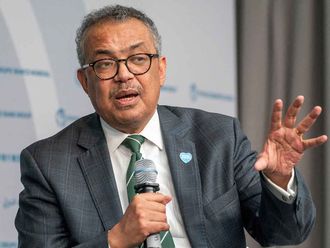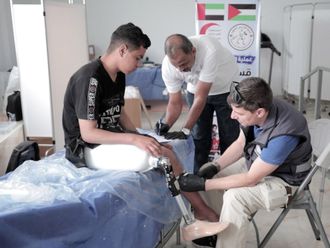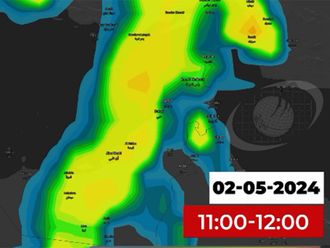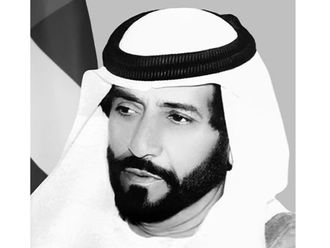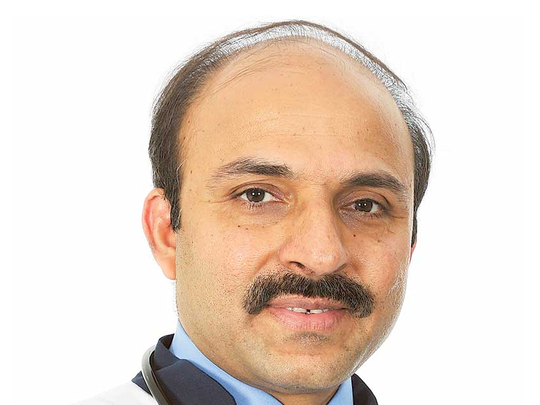
Abu Dhabi: Indians are more likely to face premature death due to heart attacks and strokes owing to genetic factors as compared with people of other nationalities, specialist doctors told Gulf News.
Dr Dinesh Babu, consultant of cardiovascular disease at Medeor Hospital Abu Dhabi, told Gulf News that World Health Organisation’s (WHO) global disease statistics cited cardiovascular diseases, including brain and heart attacks, as the two major causes of premature loss of life. Both causes are related to the state and function of blood vessels — one supplying blood to the heart and the other to the brain.
The underlying reason for both health crises is due to the narrowing of these blood vessels owing to cholesterol deposits. And several studies have indicated that Indians are more likely to be affected by this problem at an earlier age as compared to Westerners, Dr Babu said.
In the West, the onset of heart diseases usually occurs in the 60-70 age group but in the Indian subcontinent, heart disease sets in people in their 40s and 50s. Studies conducted on Indians living in the US, Canada, Europe and Singapore have established this, said Dr Babu.
Very high incidences of heart disease and stroke have been reported in Indians at an early age, he said. The condition, he said is due to the gene behaviour that posits higher cholesterol deposits than normal as a result of which blockages are more common, Dr Babu said.
Pakistanis and Bangladeshis also have almost the same genetic profile but Indians being the largest community in the UAE, more cases naturally are reported from them, he said.
Dr Paul S. Thoppil, interventional cardiologist at NMC Hospital in Abu Dhabi, said genetically speaking, people from the subcontinent have smaller arteries. This compounds the problem of cholesterol deposit.
His patients, who are mostly in the age bracket of 32-45 have shown a higher incidence of the problems and the number of cases between the ages of 35 and 40 are also increasing, he said. There are cases of these conditions striking people below the age of 30 as well, he said.
Dr Thoppil recently treated a 35-year-old who had survived a sudden heart attack. “Heart attacks leading to sudden cardiac deaths [SDC] happen without warning,” he said.
An important aspect that people should keep in mind is that neglecting routine medical check-ups can have bad consequences. Youngsters are particularly vulnerable as they don’t go for check-ups believing that age is on their side. But with the current stress levels, poor diet and sedentary lifestyles led by many youngsters, and given the genetic predisposition to the narrowing of the arteries and consequent heart problems, they need to be very vigilant regarding their health and lifestyle, he advised.
The first premature heart attack in young adults can be potentially fatal and lead to Sudden Cardiac Death (SDC).
The older individuals, particularly those in their 50s and 60s, are slightly more aware of their health history and vulnerability, and therefore have probably undergone more regular medical check-ups to detect symptoms early, Dr Thoppil said.
According to Dr Babu, Indians are vulnerable to higher obesity ratios in the abdominal region, indicated as high waist circumference, that is a metabolic syndrome more specific to them. These patients have higher fat deposits in the abdominal region, including in the liver and intestines. These fats, being metabolically more active, lead to high cholesterol production and subsequent cholesterol deposition in the arteries. Although the actual reasons for this metabolic syndromes’ higher prevalence in this population are not yet known, these are the assumptions made by several studies. Even diabetes and high blood pressure are more common in the Indian population, just as they are also in people in the Middle East.
All these conditions have an earlier onset in these populations as compared to Westerners.
The incidence of heart attacks and brain strokes are on the increase among Indians in contemporary times, just as they were in high numbers in the US between 1900 and 1960. After 1960, in the US, there was a steady fall in these numbers as increasing levels of awareness, higher frequency of medical check-ups and lifestyle changes turned the tide back, he said.
Some of the significant factors that have contributed to Indians becoming more prone to heart attacks and strokes, exacerbating the genetic predisposition, are industrialisation and globalisation leading to unhealthy eating patterns, lack of exercise and smoking that have led to an epidemic of conditions such as diabetes, blood pressure and high cholesterol.
These lifestyle diseases culminate in strokes and heart attacks, he said..
His youngest heart patient was a 19-year old Indian man who underwent an angioplasty. “Now patients in their 30s and 40s [undergoing angioplasty] are common; even 20s occasionally. In the West, this [medical procedure] occurs after 50s,” Dr Babu said.
Given the situation, Dr Babu said Indians have to start their regular medical check-ups after age 30, as compared to Westerners who are advised to do them after the age of 40.
Some of the biggest factors that are contributing to early onset of heart attacks and strokes are stress due to overwork and everyday anxieties, without measures such as exercise, leisure, consciously seeking downtime and calming the mind to combat stress. Compounding this problem are lifestyle inhibitors such as smoking, drinking and eating junk food, which sometimes are resorted to in order to offset stress.
People must become more aware of how to take charge of their mental and physical well-being, he said, in order to lead a better quality of life.
Health precautions
1. Lead a healthy lifestyle with a proper diet and regular exercise. If you do not have time for organised exercise, build in everyday physical activities into your routine such as taking the stairs instead of the elevator or parking your car at least a 10-minute walk away from your destination.
2. Getting more active physically helps you detect any underlying symptoms of bad health. For example, if you experience pains in the chest or related symptoms, while being physically active, they could be early warning signs; go for a medical check-up.
3. Find time for relax. If you are always running after making money, you will end up overworked and stressed.
4. Avoid smoking.
5. Know your numbers. Go for preventive check-ups to know your Body Mass Index (BMI) and waist circumference (to determine your obesity level), Blood Pressure, Blood Sugar and Cholesterol. Make every effort to within the healthy range.
6. If you have a family history of heart or brain diseases, go for a check-up irrespective of your age. If your father or brother had a heart or brain attack, you are also vulnerable.
7. If a heart or brain attack occurs, the first hour is called ‘golden hour’ in which timely medical help can save the life. Immediately call for an ambulance and rush the patient to a speciality hospital.
8. Youngsters have to take special care as their heart is still young and if they suffer a sudden heart attack (Sudden Cardiac Death or SDC), it may be fatal.
Source: Dr Dinesh Babu, Consultant of Cardio-vascular disease at Medeor Hospital Abu Dhabi, and Dr Paul S. Thoppil, interventional cardiologist at NMC Hospital in Abu Dhabi.



